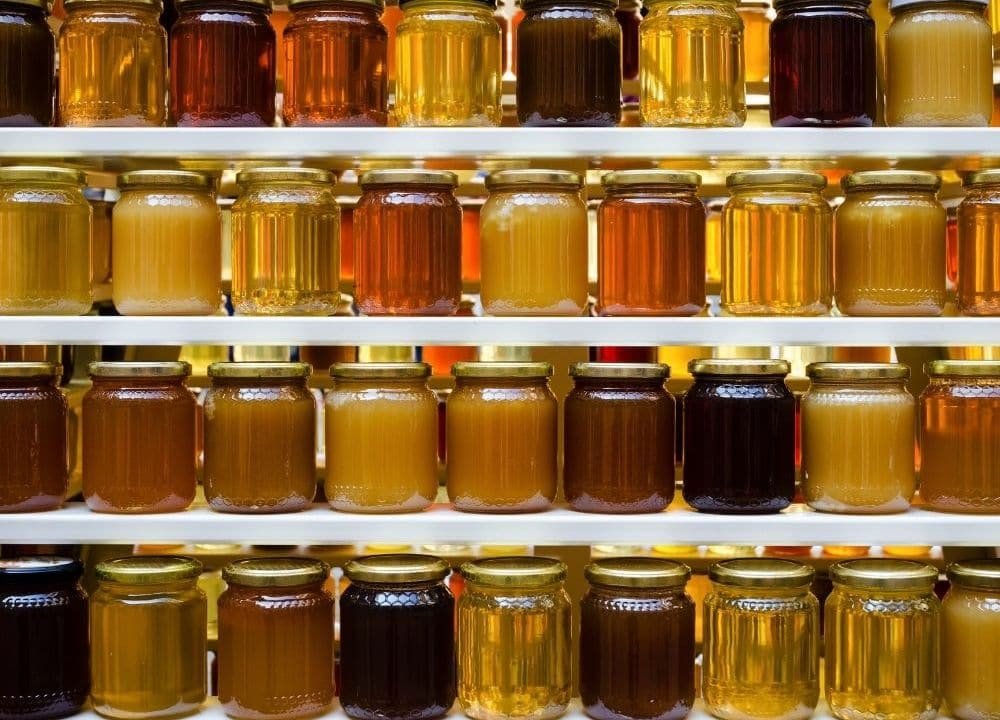We reviewed and examined many studies that found the connection between honey and dementia.
Honey might hold the key to reducing the risk of developing dementia.
While honey is known for its high sugar content, it’s still considered a great alternative to sugar in its conventional form.
It’s also gaining favor for its neuroinflammation action particularly when it comes to the brain’s hippocampus section, which is the part of the brain that is responsible for spatial memory.
That’s why the subject of honey and dementia is INCREASINGLY becoming an area of interest.
The Profile of Honey

Honey has a profile that contains different concentrations of compounds that are beneficial to the body’s wellbeing in general.
The compounds honey contains consist of enzymatic and non-enzymatic groups.
The enzymatic compounds include:
- Catalase
- Glucose oxidase
- Peroxidase
While the non-enzymatic elements include:
- Amino acids
- Ascorbic Acid
- Tocopherol
- Proteins
- Phenolic Acids
- Carotenoids
- Flavonoids
Honey also has a decent amount of acetylcholine and choline. Two neurotransmitters that are essential in promoting brain function.
The concentration of these antioxidants is dependent on the specific type of honey. Studies have established correlations between phenolic compounds and flavonoids with honey that has floral origins.
In turn, the phenolic content contained in any honey has an IMPACT on its antioxidant activity.
Some studies on honey and dementia have shown that honey can increase plasma antioxidants in tissues.
In turn, honey helps improve brain cell integrity and D as well as reduce oxidative damage.
The Study on Honey and Dementia

Honey has therapeutic and natural antioxidant properties that scientists have found are beneficial in preventing cognitive decline, and ultimately dementia.
According to research, honey can potentially have positive effects when it comes to treating a range of cancers and also reducing Irritable Bowel Syndrome (IBS) symptoms (see gut health and dementia).
The study took a five-year period concluding in 2008, and researchers focussed their efforts on assessing the impacts that honey had in relation to neurological conditions.
3,000 patients participated in the study, and half the number of participants consumed a daily honey dose.
When the study ended, 489 participants had developed dementia.
95 of the people who had developed dementia were from the group that ate the daily dose of honey.
The rest came out of the group that hadn’t eaten any honey over the duration of the study.
How Honey Can Help Reduce The Risk of Dementia

Yet another study conducted in 2014 on honey and dementia found that honey is loaded with polyphenols which refers to beneficial natural compounds.
Polyphenols were found to reduce the inflammations experienced in the brain while also improving memory loss.
The inflammation that occurs in the brain has a link to Alzheimer’s disease.
Researchers set out to look into the effects honey had on a range of neurological conditions INCLUDING Huntington’s disease, Alzheimer’s disease, and Parkinson’s disease.
The conclusion was that honey had strong antibacterial properties that proved helpful in combating the MRSA superbug.
New Zealand produces Manuka honey which originates from the manuka bushes that are pollinated by bees.
The research found that this particular honey gave antibiotics the “nudge” needed to become more effective, and in some instances, even reverse the body’s antibiotic resistance.
Manuka honey also proves helpful in treating strep throat that comes about from an inflammation in the area.
Plus, it assists in stopping the action of bacteria that triggers infection growth.
The Impact of Honey and Dementia In Relation to Oxidative Damage

Research also found that honey consumption could improve overall cognitive function in postmenopausal women.
The study also further assesses the ability of honey to protect the brain against oxidative damage that comes about with aging.
Oxidative damage is observed most in regions of the brain that are known to cause the cognitive dysfunctions seen with Alzheimer’s disease.
Oxidative damage has also been identified as an impediment to the process of transcription and replication of mitochondrial DNA.
In turn, it AFFECTS the biological circulation of reactive oxygen species (ROS) that assist with countering oxidative stress and maintaining the antioxidant defense systems of the body’s cells.
That is where honey’s antioxidant properties come in again because it can help boost ROS function while also restoring the antioxidant defense system.
Final Thoughts About Honey and Dementia
The studies on honey and dementia found that oxidative stress is one of the aspects that cause neurodegenerative disorders as we age.
The studies also concluded that honey can have a POSITIVE effect as a therapeutic agent to fight against oxidative damage while also slowing down the process of cognitive decline.
Honey supplementation can also boost the antioxidant defense system within the brain cells which in turn helps preserve cognitive ability and brain functions.
However, it’s always best to talk to your doctor first. Too much honey will not necessarily bring better results, so pay close attention.

